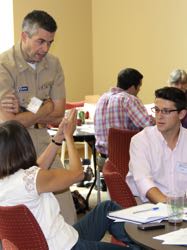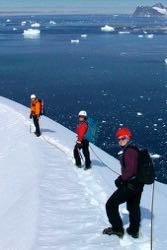Best Student Paper Awards
Each year a committee of faculty and students undertakes the difficult task of choosing the best journal articles from the many high-quality papers written by VIMS graduate students. Each paper considered is either accepted, in press, or published in a high-quality, peer-reviewed journal. The papers reflect the superb quality of the research conducted by VIMS students and the outstanding mentoring of their advisors. Papers are judged for the scope of problem, degree of challenge, magnitude of student effort, hypothesis formulation and testing, and writing style.
The committee members—Rich Brill, Ryan Carnegie, Lúcia Safi, Matt Kirwan, and Christine Meynard—evaluated 15 papers.
PhD Category
This year’s choice for the best paper in the PhD category recognizes the outstanding work of Mr. Ike Irby.
 Ike’s winning paper “Challenges associated with modeling low-oxygen waters in Chesapeake Bay: a multiple model comparison” represents the first chapter in his dissertation. The paper, published in Biogeosciences, evaluates the relative performance of 8 hydrodynamic oxygen models for Chesapeake Bay. The work involved coordinating the efforts of 14 co-authors, including advisor Marjorie Friedrichs, across 11 academic and governmental institutions, an extraordinarily complicated challenge for a student early in his career. The product is elegantly organized and illustrated and clearly written, and presents an important result: that simple oxygen parameterizations can perform just as well as more complex, full biogeochemical models in forecasting short-term hypoxia in Chesapeake Bay. Read the paper on-line.
Ike’s winning paper “Challenges associated with modeling low-oxygen waters in Chesapeake Bay: a multiple model comparison” represents the first chapter in his dissertation. The paper, published in Biogeosciences, evaluates the relative performance of 8 hydrodynamic oxygen models for Chesapeake Bay. The work involved coordinating the efforts of 14 co-authors, including advisor Marjorie Friedrichs, across 11 academic and governmental institutions, an extraordinarily complicated challenge for a student early in his career. The product is elegantly organized and illustrated and clearly written, and presents an important result: that simple oxygen parameterizations can perform just as well as more complex, full biogeochemical models in forecasting short-term hypoxia in Chesapeake Bay. Read the paper on-line.
Master's Category

The choice for best paper in the Master's category for 2015 recognizes the outstanding work of Ms. Miram Gleiber.
Miram’s paper “Copepod summer grazing and fecal-pellet production along the Western Antarctic Peninsula,” was published in the Journal of Plankton Research with co-authors Deborah Steinberg and Oscar Schofield. The research required a difficult array of shipboard analyses in polar waters, and the result has been called “the most comprehensive paper on copepod grazing in the Southern Ocean,” and is of particular import given the area’s high productivity and rapidly changing climate. Miram’s paper included a clear emphasis on the generality and importance of the results and presented material in a very straightforward way, making highly technical work readily approachable to non-expert readers.

